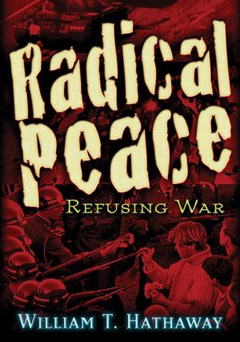Instilling the will to kill in Special Forces training is equally important as teaching the skills to kill. Commandos are heavily indoctrinated in the rightness of using violence to maintain the US empire. It's part of the esprit de corps, inseparable from the ethos of patriotism.
It's not surprising, then, that few Green Berets can throw off this indoctrination, reject violence, and rebel against the military, against a part of themselves. Those who do so are usually extraordinary people with stories to tell.
One such Special Forces veteran, William T. Hathaway, has defected from the warrior cult and exposed it in a series of books and articles. In addition to writing, he supports counter-recruitment work to persuade young people not to join the military. He is active in a group that encourages soldiers to refuse to kill. For those who want to desert, they have a sanctuary network that helps them build new lives.
“Refusing or deserting the military takes great courage. If convicted, they're punished viciously because they're such a threat to the government's power. They're the real heroes,” the combat-decorated veteran states. “I wish I'd been that brave and that morally aware.”
His latest book, RADICAL PEACE: People Refusing War, tells the first-person experiences of war resisters, deserters, and activists in the United States, Europe, Iraq, and Afghanistan. It's a journey along diverse paths of nonviolence, the true stories of people working for peace in unconventional ways.
Disappointed by Obama's continuation of the killing, they have moved beyond demonstrations and petitions into subversion and direct action to stop the war. Being peaceful doesn't mean obeying a violent government, they say. They are helping soldiers to desert, destroying computer systems, trashing recruiting offices, burning military equipment, and sabotaging defense contractors. These criminals for peace are defying the Patriot Act and working underground in secret cells to undermine the US military empire.
Noam Chomsky called RADICAL PEACE, “A book that captures such complexities and depths of human existence, even apart from the immediate message.”
Among the persons profiled:
A woman soldier who was raped by a fellow GI in Iraq. Her commanding officer refused to prosecute the rapist and threatened her with disciplinary action if she “made trouble.” With the help of the group, she deserted and is now living with a female partner in the Netherlands.
Trucker, the code name of a man who is committed to aggressive forms of resistance, such as destroying government property. He classifies his sabotage as nonviolent because it doesn't harm human beings, only things. His specialty is burning military vehicles.
An Iraqi student whose family was brutalized by American soldiers. She tells how this turned her brother into a resistance fighter.
A high school teacher who was fired and blacklisted for teaching her students how US foreign policy has provoked terrorism. The experience changed her from a Republican into a radical activist.
A gay Afghan refugee who describes the similarities between the Taliban and the US Army.
A Granny for Peace who found young allies in her struggle against military recruiting.
A janitor who destroys computers at defense contractors with electrical surges.
A traumatized veteran who has a healing love affair with his mother.
A young woman whose friend returned home from Iraq crippled. She hurled a rock through the window of the local recruiting office … and discovered she likes the music of shattering glass.
A seminary student who was assaulted by soldiers at a peace demonstration. She decided to learn to love her enemies by becoming a military chaplain and subverting from within.
A woman soldier who deserted after being sexually harassed by both male and female colleagues.
A sailor who went on weekend pass to a Buddhist retreat and came back a pacifist.
A wounded soldier who escaped from military detention and deserted rather than being sent back to combat.
Hathaway's first book, A WORLD OF HURT, won a Rinehart Foundation Award for its portrayal of the blocked sexuality and need for patriarchal approval that draw men to the military.
“I was trying to uncover the psychological roots of war, the forces that so persistently drive us to slaughter,” says Hathaway. “Our culture has degraded masculinity into a deadly toxin. It's poisoned us all. Men have to confront this part of themselves before men and women together can heal it. I was lucky to have found a partner skilled at this.
“Understanding the effects that our culturally imposed gender roles have on us is crucial to understanding why we go to war. One attraction of war is that it is a substitute for eroticism; it is the ultimate sexual perversion. It also reduces our ability to love.”
Hathaway's second book, CD-RING, is a young-adult novel about a boy learning the need for peaceful communication. SUMMER SNOW tells of an American warrior in Central Asia who falls in love with a Sufi Muslim and learns from her an alternative to the military mentality. Hathaway's writing won him a Fulbright professorship at universities in Germany, where he currently lives. A selection of his work is available at www.peacewriter.org.
William T. Hathaway's books shine light into the military's heart of darkness. This defector from the elite guard has become an effective opponent of the empire he once served, and his example may help other soldiers to rebel and tell their stories.
